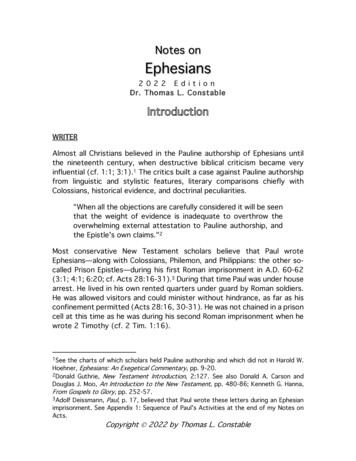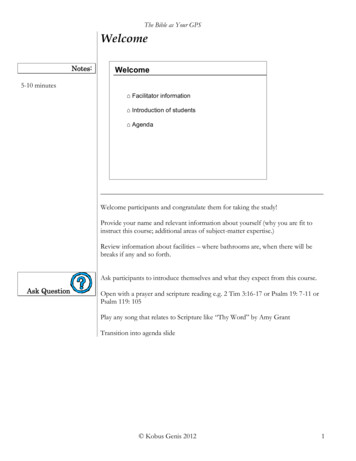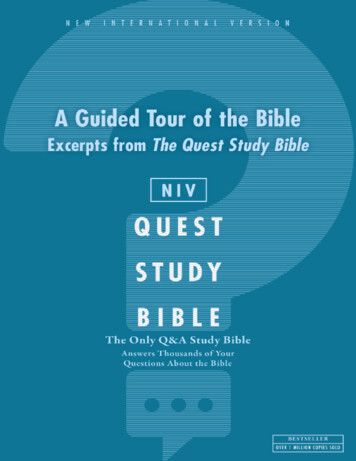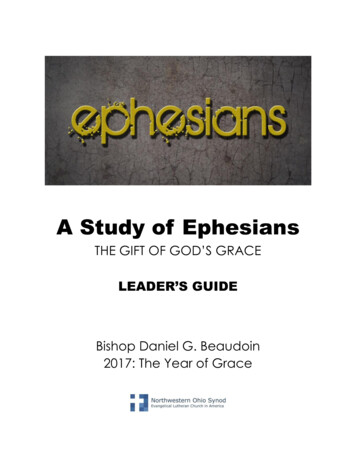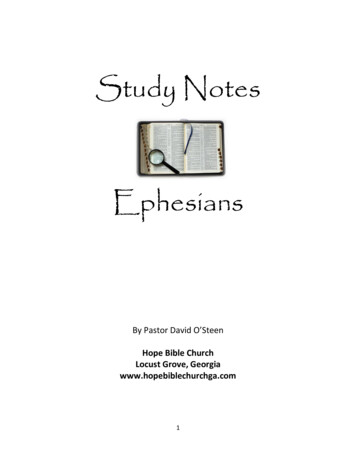
Transcription
Study NotesEphesiansBy Pastor David O’SteenHope Bible ChurchLocust Grove, Georgiawww.hopebiblechurchga.com1
IntroductionThe apostle Paul’s epistle to the Ephesians contains 6 chapters, 155 verses, and 3,022 words. Thisis not a detailed commentary on every verse, but rather a collection of my personal study noteson this great epistle. Due to a busy schedule, time has not been spent on editing for grammaticaland spelling mistakes. Thank you in advance for overlooking them. I do not claim completeoriginality for everything written in these notes. I appreciate the help that I have gleaned fromothers.It is my goal in these notes to help you gain a basic understanding of what each passage says andteaches as you study the book for yourself. Of course, this will not be possible unless youpersonally: Believe the word of God (1 Thess. 2:13) Submit to and rely upon its Author (2 Tim. 3:16) Consistently follow His rule of study (2 Tim. 2:15)The Pauline epistles are not arranged chronologically. They are arranged according to a divineorder for the spiritual edification of the Body of Christ. According to 2 Tim. 3:16, we must havedoctrine, reproof, correction, and instruction to be edified in the faith. The apostle Paul wrotenine epistles by inspiration of God to seven churches (Galatians actually written to a number oflocal churches in the region of Galatia).Salvation in Christ Romans - Doctrine of salvation by grace through faith: justification and sanctification 1 & 2 Corinthians - Reproof for not living by the doctrine of Romans (sanctification) Galatians - Correction for listening to doctrine not in line with Romans (justification)Body of Christ Ephesians - Doctrine of the one Body of Christ: the Head and His members Philippians - Reproof for not living by the doctrine of Ephesians (lack of unity, members) Colossians - Correction for listening to doctrine not in line with Ephesians (“not holding theHead”)Coming of Christ 1 & 2 Thessalonians - doctrine, reproof, and correction concerning the coming of the LordTaken together, these epistles provide the “form of sound words” (2 Tim. 1:13) for instruction inrighteousness for the Body of Christ in this present mystery age. The apostle Paul also wrote fourepistles to individuals. The epistles to Timothy and Titus concern the proper order for the church.The second epistle to Timothy deals with the apostasy of the last days. The epistle to Philemonis fittingly placed last because it illustrates the doctrines of Paul's epistles through a real-lifesituation.2
Apostasy is a willful denial and departure from the truth. It is apostasy in this present age to denythe distinctive message and ministry of the apostle Paul (2 Tim. 1:13-15). Satan attacks the threemain doctrines of the church epistles like nothing else. A study of church history shows a cleardeparture from and resurgence of Pauline truth.Ephesians is built upon the doctrinal foundation laid in Romans. The last verses of Romansmentions the great mystery that Ephesians unfolds (Rom. 16:25-27). Ephesians is the pinnacle ofdivine revelation. In Romans we learn that we are crucified, buried, and risen with Christ (Rom.6:3-4). In Ephesians we learn that we are ascended up and seated with Christ in heavenly places(Eph. 2:6).The six chapters of Ephesians are naturally divided in half (Eph. 1:3; 4:1) and provided a perfectbalance between doctrine and practice:Ephesians 1-3WealthStandingCallingBlessingsRichesEphesians 4-6WalkStateConductBehaviorResponsibilities3
Chapter One[1] Paul, an apostle of Jesus Christ by the will of God, to the saints which are at Ephesus, andto the faithful in Christ Jesus:Paul’s name is the first word in every epistle that he wrote (2 Thess. 3:17). God put an emphasison Paul’s distinct ministry. Many of his epistles state something about his apostleship in the firstsentence (e.g. Gal. 1:1). He was given a distinct ministry from the twelve apostles and thereforehis apostleship was constantly under attack.All believers are saints (sanctified in Christ). It is God’s will that we are part of two churches inthis age. We become members of the church which is the Body of Christ upon salvation and weshould also assemble together locally with other like-minded believers for service (see also Phil.1:1-2; Col. 1:1-2).Commentators make a big deal about the words “at Ephesus” supposedly not being in some ofthe ancient manuscripts. They talk about how this was to be an encyclical letter. All of Paul’sletters were copied and passed around to the brethren (Col. 4:16).The record of Paul’s ministry at Ephesus is found in Acts 18-20. He spent three years there andthe ministry continued on after his departure with the help of Aquila and Priscilla and Timothy.There were Gentiles saved after Paul left because he mentions that he heard of their faith (v.15).Perhaps Paul referred specifically to the “faithful” because in this letter he is speaking to thespiritual saints that can bear the meat of the word, unlike the carnal saints at Corinth (1 Cor. 2:18).By the way, comparing this letter with the letter to the church at Ephesus (Rev. 2:1-7) proves thatthey are different churches under different programs (the seven churches in Rev. 2-3 are futureJewish churches in the tribulation period). For example, compare Eph. 1:3 with Rev. 2:7.[2] Grace be to you, and peace, from God our Father, and from the Lord Jesus Christ.Grace precedes peace (Rom. 5:1). Paul says more about the grace of God than all the other Biblewriters combined! Have you ever noticed that Paul never sends greetings from the Holy Spirit?We are sealed with the Spirit (v.13). Compare this with John’s greeting to the tribulation saints(Rev. 1:4).[3] Blessed be the God and Father of our Lord Jesus Christ, who hath blessed us with all spiritualblessings in heavenly places in Christ:We ought to bless God for all His blessings (Ps. 103:1-2)! In vs.3-14 the apostle Paul outlines some(not exhaustive list) of the spiritual blessings we have from the Father (vs.3-6), the Son (vs.7-12),and the Spirit (vs.13-14). Each member of the Godhead is active in salvation. It has been4
accomplished and made available by the will of the Father, the work of the Son, and the witnessof the Spirit. Each section is one sentence and ends with praise to the glory of God.Most Christians never come to understand the plain truth of this verse: We are blessed with ALL blessings the moment of salvation (Col. 2:10) These blessings are spiritual, not physical and material These blessings are in “heavenly places,” not on earth (Eph. 1:3; 1:20; 2:6; 3:10)Most professing Christians seem to think they are God’s earthly people in a covenantrelationship. They claim the blessings of Deut. 28:1-14, but conveniently forget about all thecurses in vs.15-68.IsraelMaterial BlessingsOn EarthBased on PerformanceBody of ChristSpiritual BlessingsIn Heavenly PlacesBased on Position[4] According as he hath chosen us in him before the foundation of the world, that we shouldbe holy and without blame before him in love:We are chosen “in Christ” (2 Tim. 1:9). Christ is God’s elect (Isa. 42:1-4). When did we get inChrist? When we trusted Him as Savior (v.13), NOT before the foundation of the world (else wewere in Christ, out of Christ, back in Christ). God foreknew that we would trust Christ. Nobody ispredestinated to salvation or damnation. Those who are saved are predestinated unto glory. Thestanding of the Body of Christ before God is that we are holy, without blame, and in His love. Wecertainly don’t have to keep ourselves in the love of God (compare Jude 21 with Rom. 8:38-39).God has a twofold purpose that is revealed in His word (v.10; Gen. 1:1).1) Heaven (Body of Christ) – planned BEFORE foundation of the world (1 Cor. 2:7), keptsecret since the world began (Rom. 16:25; Eph. 3:9)2) Earth – (Israel) prophesied FROM foundation of world (Matt. 25:34), spoken since theworld began (Acts 3:21)Satan, whose primary habitation is in the heavens, was focused on defeating God’s plan for theearth and had no idea about God’s plan to reconcile the heavens to Himself. Israel will inherit theearth, but we live eternally in the heavens (2 Cor. 5:1). We will replace the fallen principalitiesand powers (Eph. 3:10; Rev. 12:7-9).[5] Having predestinated us unto the adoption of children by Jesus Christ to himself, accordingto the good pleasure of his will,The word adoption is not used here in the sense of making someone a child who was not borninto the family (always a hindrance to read modern and western definitions into Bible words).We were born into the family of God upon salvation. Adoption, as used by Paul, is about position5
rather than relationship. It is the full placement as a son. It has to do with position and the rights,privileges, and responsibilities that come with that position (Gal. 4:1-7).Being complete in Christ we have this position now, but we have yet to fully enter into theexperience of all that it means to be a son of God. The apostle Paul speaks of adoption in relationto the Body of Christ in three passages and applies it in three tenses:1) As to the past, we were predestinated unto adoption (Eph. 1:3-6)2) As to present, we now have the Spirit of adoption (Rom. 8:15; Gal. 4:5-6)3) As to the future, we are waiting for adoption (Rom. 8:23)"Abba" is Aramaic and is an intimate term for father, like our English word “Daddy”. This is whatJesus called the Father when He was praying in Gethsemane (Mk. 14:36). We are accepted in thebeloved!Note that predestination is for God (“to himself”) and according to the good pleasure of His will(v.9, 11). This does not mean we have no will in the matter. By our will we can only receivesalvation: we cannot accomplish it (Jn. 1:11-13).[6] To the praise of the glory of his grace, wherein he hath made us accepted in the beloved.God made us accepted by His grace (2 Cor. 5:21; Col. 1:12). Christ is the Beloved (v.7; Matt. 12:18,note beloved and elect). God accepts us as He does Jesus Christ! This has to do with our standingChrist. However, as to our state, we must labor to be accepted as a servant (2 Cor. 5:9; Rom.14:17-18).[7] In whom we have redemption through his blood, the forgiveness of sins, according to theriches of his grace;To be redeemed is to be purchased with a price. What was the price? The precious BLOOD ofChrist. There could be no redemption without His blood. How many sins did He forgive? ALL ofthem: past, present, and future (Col. 2:13)! The riches of His grace has given us unsearchableriches (3:8, not measured by human mind, cannot be searched out in OT prophecy).[8] Wherein he hath abounded toward us in all wisdom and prudence;[9] Having made known unto us the mystery of his will, according to his good pleasure whichhe hath purposed in himself:[10] That in the dispensation of the fulness of times he might gather together in one all thingsin Christ, both which are in heaven, and which are on earth; even in him:The mystery was no afterthought or “Plan B.” It is His eternal purpose (Eph. 3:11). It is ademonstration of His great wisdom (Eph. 3:10; 1 Cor. 2:7). One of our spiritual blessings isknowing the mystery of God’s will concerning the dispensation of the fullness of times. Antidispensational preachers accuse us of teaching that God failed in trying to establish His kingdomthrough Israel. They claim Christ preached a spiritual kingdom only and that His promises are6
being fulfilled spiritually in the church. Those that spiritualize the scripture tell spiritual lies. Israelfailed, not God! He knew they would fall and He planned that through their fall He wouldreconcile the world to Himself (Rom. 11:11-15, 32-36).The word “dispensation” is found four times in the Bible (Eph. 1:10; 3:2; 1 Cor. 9:17; Col. 1:25). Adispensation is simply a dispensing of divine revelation. It is a dealing out, administration, oreconomy. Some think the dispensation of the fulness of times refers to the kingdom age. I believeit is the eternal state after the creation of a new heaven and earth. There is one family of God(Eph. 3:14-15), but there will be a distinction throughout eternity between the things in heavenand earth. All the redeemed are “in Christ”. A person can only be “in Adam” or “in Christ” (1 Cor.15:22). Christ is the foundation to both programs (“chief corner stone”, Eph. 2:20; 1 Pet. 2:6). So,the fact people were in Christ before Paul (e.g. Rom. 16:7) does not prove the Body of Christbegan before his ministry.Notice the absence of “things under the earth” in v.10 (Phil. 2:10; Col. 1:20). There is no universalsalvation. Those who die lost will remain lost for eternity.[11] In whom also we have obtained an inheritance, being predestinated according to thepurpose of him who worketh all things after the counsel of his own will:How amazing that we Gentiles, who were strangers from the covenants of promise, haveobtained such a glorious inheritance (Eph. 2:11-13)! Every member of the Body of Christ has aguaranteed inheritance in Christ. However, we may add rewards to that inheritance (Col. 3:24).[12] That we should be to the praise of his glory, who first trusted in Christ.That Christ would save us and give us a glorious inheritance is to the praise of His glory. All wedid was trust Christ (depending not on our works, but His perfect and finished work).[13] In whom ye also trusted, after that ye heard the word of truth, the gospel of your salvation:in whom also after that ye believed, ye were sealed with that holy Spirit of promise,[14] Which is the earnest of our inheritance until the redemption of the purchased possession,unto the praise of his glory.Salvation is in a Person (“In whom”). We are saved by grace the moment we believe on Christ. Tobelieve on Him is not merely a mental assent that He is the Savior. It is to TRUST Him alone asyour personal Savior.This is a great verse to explain how to be saved. We hear the word of truth, believe it, and we areimmediately sealed with Spirit. What is the gospel of OUR salvation? It is the good news thatChrist died for our sins, was buried, and rose again the third day (1 Cor. 15:3-4). In “rightly dividingthe word of truth” (2 Tim. 2:15) we must rightly divide the different gospels revealed in scripture.There is only one gospel by which we are saved in this age (Gal. 1:6-12). The word of truth for7
Israel to be saved (Acts 2:38) is not the word of truth for all men in this age of grace (Acts 16:31;1 Cor. 1:17).The Spirit of God does various things for us upon salvation. He:1) Circumcises (Col. 2:13)2) Regenerates (Titus 3:5)3) Baptizes (Col. 2:12)4) Indwells (1 Cor. 3:16)5) Seals (Eph. 1:13; 4:30)A seal speaks of ownership, a finished transaction, and security. We are not in the flesh, but inthe Spirit (Rom. 8:9). By the way, that Paul calls Him the “holy Spirit of promise” does not meanhe is referring to the prophesied baptism WITH the Holy Ghost (Lk. 24:49). There are two differentspiritual baptisms as we shall see in chapters 3 and 4. What he means by “promise” is explainedin v.14. An earnest is a promise to complete a transaction.According to Webster’s 1828 Dictionary, the word earnest means, “First fruits; that which is inadvance, and gives promise of something to come. Early fruit may be an earnest of fruit to follow.The first success in arms may be an earnest of future success. The Christian’s peace of mind inthis life is an earnest of future peace and happiness. Hence earnest or earnest-money is a firstpayment or deposit giving promise or assurance of full payment. Hence the practice of giving anearnest to ratify a bargain. This sense of the word is primary, denoting that which goes before,or in advance. Thus, the earnest of the spirit is given to saints, as a pledge or assurance of theirfuture enjoyment of God's presence and favor.”The earnest of the Spirit guarantees our future glory (2 Cor. 1:22; 4:13-5:8). We are awaiting theredemption of our body. We are the “firstfruits of the Spirit” (Rom. 8:23).[15] Wherefore I also, after I heard of your faith in the Lord Jesus, and love unto all the saints,[16] Cease not to give thanks for you, making mention of you in my prayers;Paul was always thankful to hear about the testimony of real Christians. Faith in the Lord JesusChrist and love unto all the saints are hallmarks of authentic Christianity.In the first part of this chapter (vs.1-14), the apostle Paul mentions seven spiritual blessings. Inthe latter part of the chapter (vs.15-23), he prays for the Body of Christ regarding these blessings.He does not pray that we would be able to obtain these blessings, but rather that we would knowthat we already have it all in Christ!Due to their ignorance of the Pauline epistles, most believers today are seeking for things theyalready have in Christ and are therefore not enjoying the Christian life as they should be. Theylack peace and joy because of their failure to know and believe who God has made them in Christ.For example, most believers are trying to obtain blessings (v.3), forgiveness (v.7), and acceptance(v.6) from God when He has already given us these things in Christ.8
The first three chapters reveal doctrine about the Body of Christ: Chapter 1 – Our spiritual blessings in heavenly places in Christ Chapter 2 – How we are made members of the Body of Christ Chapter 3 – The Body of Christ was a mystery revealed through PaulThere are two prayers in this first section and they are both about believers having a spiritualknowledge of the truth set forth in these chapters (1:15-23; 3:14-21). The prayers in Paul’s prisonepistles are spiritual (see also Phil. 1:9-11; Col. 1:9-14). We may pray about physical things, butsurely the emphasis in our prayers should be on the spiritual. Spiritual knowledge of God is ourgreatest need![17] That the God of our Lord Jesus Christ, the Father of glory, may give unto you the spirit ofwisdom and revelation in the knowledge of him:[18] The eyes of your understanding being enlightened; that ye may know what is the hope ofhis calling, and what the riches of the glory of his inheritance in the saints,[19] And what is the exceeding greatness of his power to us-ward who believe, according tothe working of his mighty power,The knowledge Paul is talking about is a spiritual knowledge that only comes by the Spirit (1 Cor.2:6-16). Many churches today are caught up in the vain philosophy of, “Know thyself,” but Paulprays that we would know:o God (v.17) – Our great goal should be, “that I may know him” (Phil. 3:10).o The hope of HIS calling (v.18a) - There is one hope of our calling (Eph. 4:1, 4). Our callingis “high” (Phil. 3:14) and “holy” (2 Tim. 1:9). We are called by Paul’s gospel (2 Thess. 2:14).The Body of Christ is a called-out assembly. We are assembled in Christ in heavenly places(Eph. 2:6). Yet, many claim that a church can only be local. Our hope is to be caught upand glorified with Christ in heaven (1 Cor. 15:51-52; 1 Thess. 4:13-18; Phil. 3:20-21; Col.3:1-4; Titus 2:13). Our position is eternal in the heavens (Eph. 2:6-7; 2 Cor. 5:1). The hopeof Israel’s calling concerns a kingdom on the EARTH. The far majority of believers todaythink they have the hope of Israel’s calling.o The riches of the glory of HIS inheritance in the saints (v.18b)o The exceeding greatness of HIS mighty power (v.19)The apostle Paul was given a twofold ministry for this present age: to every creature with thegospel (Col. 1:23) and to the church with the mystery (Col. 1:24-29). Satan knows what God isdoing in this age and is working to keep the lost blinded to the truth of the gospel of grace andbelievers blinded to the truth of the Body of Christ. Based on Paul’s prayer (v.18), it is possiblefor believers to be blinded to spiritual truth. What blinds believers to God’s truth? Very often itis the religious TRADITIONS of men (Col. 2:8).[20] Which he wrought in Christ, when he raised him from the dead, and set him at his ownright hand in the heavenly places,[21] Far above all principality, and power, and might, and dominion, and every name that isnamed, not only in this world, but also in that which is to come:9
[22] And hath put all things under his feet, and gave him to be the head over all things to thechurch,[23] Which is his body, the fulness of him that filleth all in all.Most people seem to be only interested in what the power of God can do FOR them in a visibleand tangible way. God is not doing signs and wonders in this age. However, His mighty power isat work IN us spiritually (Eph. 3:20). We have the resurrection power of God that enables us towalk in newness of life (Rom 6:3-4).Christ went down into the lower parts of the earth (Eph. 4:9), but is now exalted far above allheavens (Eph. 4:10). He is seated far above all principality, power, and might, and dominion; bothvisible and invisible (Col 1:16). As members of His Body, we are seated with Him and will reignwith Him over all things eternally.The first church that I ever “joined” was a Baptist church. They taught me as a young Christianthat there is only a local and visible church on earth that is entered through water baptism. TheLord used vs.22-23 to show me that there is one true spiritual church made up of all believers inthis age. It is the church, which is the Body of Christ. There are many local churches, but there isonly ONE BODY (Rom. 12:4-5; 1 Cor. 12:13; Eph. 4:4). Christ fills all the members of His Body withall spiritual blessings. All believers in this age are baptized by one Spirit into this one Body uponsalvation (1 Cor. 12:13).10
Chapter TwoThe first chapter was about our possessions as members of the Body of Christ. This chapter isabout our position as members of the Body of Christ. The first chapter was all about what itmeans to be a member of the Body of Christ. In this chapter, we learn how we become membersof the Body of Christ. It is not by anything that we are or that we can do. It is totally by the GRACEof God! Only God can take a dead sinner and make him a living saint. There is a stark contrastbetween the way this chapter opens and closes. Those who were once a habitation for the spiritof Satan (v.2) are made to be a habitation of God through His Spirit (v.22).The first part of the chapter deals with sinners as individuals (vs.1-10) and the later part withGentiles as a group (vs.11-22). Both passages outline themselves:I.II.III.Who we were (vs.1-3)But God (vs.4-9)Who we are now (v.10)I.II.III.In times past (vs.11-12)But now (vs.13-18)Ye are (vs.19-22)[1] And you hath he quickened, who were dead in trespasses and sins;[2] Wherein in time past ye walked according to the course of this world, according to theprince of the power of the air, the spirit that now worketh in the children of disobedience:[3] Among whom also we all had our conversation in times past in the lusts of our flesh,fulfilling the desires of the flesh and of the mind; and were by nature the children of wrath,even as others.We should not dwell on our past, but it’s good to remember where we were and how God savedus (Titus 3:1-7). The Bible has nothing positive to say about the flesh (see Rom. 1-3, bad newsbefore the good news). All lost sinners are dead in trespasses and sins. There are different kindsof death mentioned in the Bible and none of them mean annihilation. Death is a separation. Paulis talking about spiritual death, which is separation from the Spirit of God (Eph. 4:17-19). Thosewho die physically in a lost condition will suffer the second death (Rev. 20:14-15).Notice three destructive forces that worked in our lives as lost sinners:1) World – The course of this present evil world is according to the lust of the flesh, the lustof the eyes, and the pride of life (1 Jn. 2:16).2) Devil – It is a course that is set by Satan who is the god of this world (2 Cor. 4:4). Satan’sprimary habitation is in the second heaven (Eph. 6:12). He is cast out in the midst of thetribulation period (Rev. 12:9). Satan is a spiritual being. If we are going to stand againsthim, we must put on the spiritual armor of God and use the spiritual weapon of the wordof God.11
3) Flesh – This verse defines lusts as desires. The flesh desires to fulfill its desires in anunlawful manner. We are sinners by nature (Rom. 5:12). It is in our human nature todisobey God. You don’t have to teach your children to sin (Ps. 51:5). Children ofdisobedience are children of wrath (Eph. 5:3-6).Notice the “we all” in v.3. George Williams (1850-1928) wrote, “The Apostle Paul prior to hisconversion lived a blameless life of religious rectitude; the Ephesians prior to their conversionwallowed in an appalling abyss of idolatry and obscenity. Yet the Apostle says that there was nomoral difference between him and them. They were all alike corrupt by nature, they were allalike dead in sins, sons of disobedience, led by the spirit of Satan and under the wrath of God(vs.1-3). These are fact revealed by the Holy Spirit Who is infallible; but these are facts that mandenies, and the assertion of which enrages him.”[4] But God, who is rich in mercy, for his great love wherewith he loved us,[5] Even when we were dead in sins, hath quickened us together with Christ, (by grace ye aresaved;)[6] And hath raised us up together, and made us sit together in heavenly places in Christ Jesus:[7] That in the ages to come he might shew the exceeding riches of his grace in his kindnesstoward us through Christ Jesus.[8] For by grace are ye saved through faith; and that not of yourselves: it is the gift of God:[9] Not of works, lest any man should boast.“But” is a little word that makes a big difference in the Bible, especially when it says, “But God!”God makes all the difference. When a sinner trusts Christ for salvation he is instantly quickened(made alive spiritually), raised up, and seated with Christ in heavenly places (Phil. 3:20; Col. 3:14). Our position will be in heavenly places throughout the ages to come (as trophies of His grace).All of this is accomplished by spiritual baptism (1 Cor. 12:13; Eph. 4:5). Ephesians is furtherrevelation from Romans which taught us that we are crucified, buried, and risen with Christ (Rom6:3-6). How could a righteous God do such wondrous things for unrighteous sinners? It is becauseof Christ (Eph. 4:32; Rom. 6:23).Note: “with Christ” (v.5); “in Christ” (v.6); “through Christ” (v.7). Rich Mercy – He never runs out! He has enough mercy to save any sinner! God’s mercymay be defined as an outward manifestation of His pity and compassion by which Herelieves the misery of the sinful and suffering in their distress. Mercy presupposes misery.Mercy is God NOT giving man what he deserves. Great Love – Proven by the cross (Rom. 5:8). Abounding Grace – Grace has to do with what God freely gives us in Christ Jesus (2 Cor.8:9). Grace and works are mutually exclusive in our salvation (Rom. 11:6; Titus 3:5). Wecannot earn salvation by merit or forfeit it by demerit. God has always been gracious, butthere is a difference between grace in a dispensation and a dispensation of grace (Rom.5:20-21). Noah found grace (i.e. favor) because he was perfect in his generations (Gen.12
6:8-9). Paul is the pattern of salvation for this present age (1 Tim. 1:11-16). Does “that notof yourselves” refer to salvation or faith? Both. We are justified by the faith of Christ.[10] For we are his workmanship, created in Christ Jesus unto good works, which God hathbefore ordained that we should walk in them.Good works do have a place in salvation. The problem is that many put them in the wrong place.Good works are not the means of salvation: they are the fruit of it. You can’t even do good worksunless you are saved (Rom. 8:8-9). Salvation is not reformation of the old nature, but a creativework of God (4:24; 2 Cor. 5:17). We do good works through Christ in us (Phil. 1:6; 2:12-13). Goddid not save us to just keep us out of hell. He saved us unto Himself (Eph. 1:4-6; Titus 2:11-14).[11] Wherefore remember, that ye being in time past Gentiles in the flesh, who are calledUncircumcision by that which is called the Circumcision in the flesh made by hands;[12] That at that time ye were without Christ, being aliens from the commonwealth of Israel,and strangers from the covenants of promise, having no hope, and without God in the world:In latter part of this chapter (vs.11-22), the apostle Paul shows the clear dispensational changein Gods dealings with the Gentiles in this present age. God never changes in His person, principles,and promises (Mal. 3:6; Heb. 13:8), but He does change in His dealings with man. The Bible is acomplete revelation, but it was given progressively and not all at once. All scripture is profitablefor us, but in order to gain the profit from God’s word that He has placed in it for us we muststudy it His way (2 Tim. 2:15). All the Bible is the word of truth, but we must recognize andconsistently maintain the divisions that God put in His word if we are going to understand it.What was truth for Israel under the law may not be truth for the Body of Christ under grace. Thisis the dispensational approach to Bible study.A “dispensation” (used 4 times in the Bible, all by Paul) is basically a dealing out, distribution, ordispensing of something. It is an administration. Dispensations are not periods of time. Ages areperiods of time (“other ages,” “ages to come”). Dispensations operate within ages. Eachdispensation revealed in scripture is marked by five things:1) Divine revelation (bring clear changes in God’s dealings with men)2) Human spokesman (e.g. Moses and Paul)3) Human responsibility to the revelation (a testing)4) Human failure (every dispensation ends in apostasy except the last one)5) Divine judgmentIt is not enough to be biblical. We must also be dispensational. For example, tongues are biblicalbut not dispensational for today. It is dangerous to misplace things in the scripture. In the contextof 2 Tim. 2:15 the apostle Pa
Study Notes Ephesians By Pastor David O’Steen Hope Bible Church Locust Grove, Georgia www.hopebiblechurchga.com. 2 Introduction The apostle Paul’s epistle to the Ephesia
